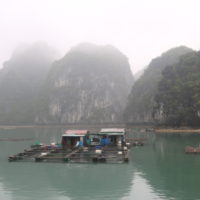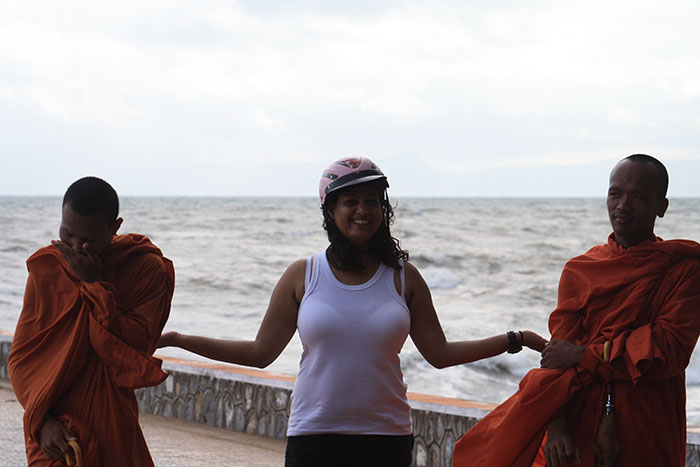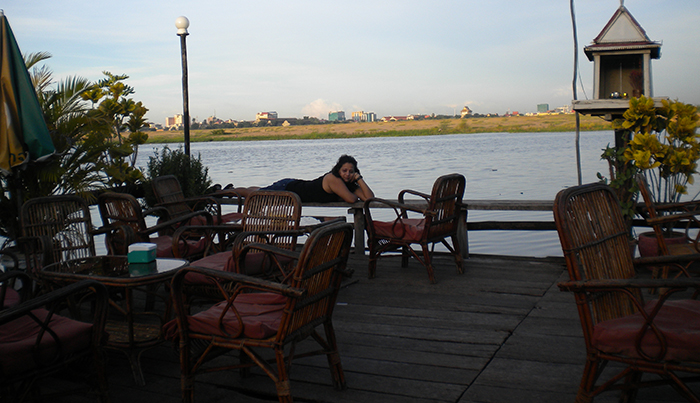There is no obvious link between its rather spicy name Red Chilies and the camp itself, and at eight dollars a night for a dorm, it is not cheap. The bed sags terribly which doesn’t say good things about the activities taking place on it, but I have not come to stay in a cheap dorm Kampala expecting to find a spanking new bed.
My sleep is disturbed by the continuous buzzing of mosquitoes which despite the cheap plastic nets have found their way inside. I manage a quite thirty minutes of sleep which The sun is up. Things are peaceful till about 8 am when the bed next to mine creaks noisily and I peep out my blanket to see Tomas, the night receptionist, leave with a very satisfied smile on his face. A young blond girl follows him.
I dress shower under the cold water, dress quickly and rush out for coffee. There is a small coffee shop next to the reception desk and a pool table at the centre of the square hall. Cane chairs lie about carelessly. I sink in to the only old but comfortable sofa and call out for coffee.
Coffee in my opinion is a very special drink that requires a passionate lover of it to appreciate its goodness and equally important is the barista who hold the secret to the perfect brew. A barista with passion always ensures the requirement of the consumer is met, which unfortunately is not forthcoming this morning.
The lackluster barista, I call him a coffee-maker instead, arrives with a large of coffee that is made with milk and I suspect, sugar. As I watch, a thick layer of cream begins to form on it. I smell milk.
I am no near to experiencing Ugandan coffee through this milky concoction.
The eagerness with which I apply myself to exploring the neighbourhood and possibilities of breakfast is commendable. I seek out the guard who is the only person I can see. Tomas is nowhere. He greets me with a guffaw.
“You sleep, maybe little? Welcome, welcome. I worked with Indian family before, in Jinja. Nice, Indian, welcome welcome. You can take breakfast anywhere. Many restaurants here.”
“Thank you.”
“You know Idi Amin? He make all Indians go. So, I come to Kampala to work.”
Of course, I knew of Idi Amin. I nod pleasantly despite not having had my coffee and no directions to a feeding spot.
“Oh, how sad,” I try to infusing feelings into these seemingly meaningless endearments and escape. I have reasons to fear that everyone in Uganda would somehow assume my interest in their sorrowful history. It is not a pleasant thought.
The guard calls out after me –
“Indians are coming back again.”
That doesn’t sound very promising either – and because I cannot see his expression through my back I find that statement particularly ominous.
I have heard from people over the years about the economic war of 1972 that pretty much cooked the goose of thousands of naturalized Indian-Ugandans.
Finding a restaurant in this part of town requires patience and to a large extent, determination. The road is either going up or down, is uneven and packed with boda bodas. The persistent blaring of horns, clutter of beaten –in cars driven by devil-may-care drivers, chattering school children and arrogant pedestrian weaving through the commotion on the roads is just the thing I see. It is not as though walking through this nightmare brings me to a restaurant worthy of mention, so I content myself with eating at a small eatery within the matatu station. There is a kerosene stove hissing and spewing under a flat iron griddle on which a spatula-wielding local is frying what he calls, chapathi an oiler version of the Indian brother. Upon my request for an egg to go with this, he grabs one and breaks it on the side of the same griddle. This he then proceeds to break up into pieces, same as the chapathi, tops it up with beans and pushes a bowl towards me. I wait for it to cool. A well-dressed man arrives shortly and barks out an order of Rolex, which I first think means the watch, only realizing quickly that it is actually a chapati wrapped around an omelet.
There is no escaping the chapati in Kampala – a legacy of the Indians who came to Uganda years ago. Idi Amin may have shooed away the Indians, but he couldn’t kill their flatbread which eventually overthrew posho as the national dish. The beans are delicious. Uganda cannot claim to be Africa’s culinary destination, or hold any appeal for a gastronome or set the average tourist’s blood flowing at the mention of its food, but it knows its beans well.
***
I take a boda-boda back to the hostel eager to get started with visiting Kasubi Tombs, a decision that Tomas doesn’t quite understand. While on the subject, I’ll add that my interest in world history is questionable, but I am determined to learn as much of Kampala’s history as I can.
“Today is Friday,” Tomas says sadly. “Why do you want to visit the tombs?”
“I am not sure, perhaps because today happens to be a free day for me?” I suggest. “And what happens at the tombs on Fridays?”
He shrugs indifferently. “Nothing much to see. You go to the mall. Or the pub. Kampala has many pubs. Very good.”
I don’t see how that helps because malls or pubs do not hold any appeal for me at the moment. I want to see the tombs and damned it is a Friday.
“How do I get to the tombs anyway?”
That’s how I meet Sandy, the boda boda man who hangs about Red Chilies and comes highly recommended by Smug Tomas. Sandy is short and dark and knows every short cut there is to know and soon enough we fetch up at the burial site of the Kabakas, the kings of Buganda which is a sub-national kingdom enjoying autonomy from the State. Interestingly, all of Uganda’s history in encompassed within this burial site and because I am not sure what to expect, when I walk through the Bujjubukula or the gatehouse made of wooden columns, reeds and thatch hut and end up at the Olugya, the main courtyard, I feel as though I have walked into a living museum.
It is a Friday morning and I bring this up for a reason.
The friendly guide-cum-receptionist-cum caretaker springs to his feet as I make my way into the room full of colorful paintings made on bark cloth.
“Hello, welcome to Kasubi Tombs,” and before I can react he throws me an earth colored lesu, an African wrap and encourages me to wear it right away.
“Errr, is this necessary?”
“Yes, yes. I will tell you why. Because you must avoid temptations.”
At this point, I am forced to ask –“Tempt whom?”
I am only about to find the answer to that. The guide explains.
“You cannot enter the Drum House.”
“Why?”
His guide mask in on and from a smiling face he has turned into a serious faced caretaker.
“The Ndoga-Obukaba (Royal Drums) are played when a Kabaka is crowned or when a member of the royal family arrives or departs; or when a family member dies. The drummer doesn’t get married. He is celibate, so you cannot enter it. It distracts the drummer.”
That answers my questions about female presence in the hut. A woman showing off her legs in the house of celibates sounds disrespectful but that doesn’t shut me up. I continue.
“Are there any drummers today?”
“No.”
“Huh?”
“This place is sacred,” he repeats firmly. “And today is Friday. You must not enter the hut.”
“Uh ok.”
I am beginning to dislike Friday altogether.
I wrap myself up in the lesu and step out into the courtyard. My eyes take in the row of huts lining the compound wall. There is not much to see. The guide appears at my elbow and gestures expansively.
“There,” he points to the center of the courtyard, “there was the Muzibu Azaala Mpanga before the fire destroyed it. Bad, very bad. Everything burnt. Gone. It is on the UNESCO World Heritage List in 2001. You find it on the internet. You can even buy pictures in the office later.”
Muzibu Azaala Mpanga, when it stood, had been the domelike structure from the picture I had seen on the office walls under which the four former Kabakas (Muteesa I (1835-1884), Basamula Mwanga II (1867-1903), Daudi Chwa II (1896-1939) and Fredrick Walugembe Muteesa II (1924-1969) had been buried.
He continues. There is a series of emotions in his voice – going from excitement when explaining the history of what was and plunging into misery when the subject of fire that destroyed the tombs comes up.
“The tomb, it was made with wood and reed and the thatch roof went all the way down to the ground. It was very interesting and sacred. The fire took it all away.”
Fortunately, he abandons the dramatics and shows me a series of scattered buildings and graveyards located behind the tombs. Interestingly these buildings house the descendants of Kings’ former wives or widows – the keepers of royal secrets. It is not really fair to judge them by their living standards. The ‘royal’ women are tending to cassava and yam bush, calling out to each other in some strange language before suddenly pointing at me. I think they are calling out a greeting.
I wave back cheerfully.
It is indeed an invitation to enter the royal hut and partake of royal tea made on wood fire in the common kitchen held together by ropes and vines. Royalty here isn’t always about the crowns and jewels – it is about having a roof over your head, about cows, pigs and cassava plants and being able to afford tea with milk.
“The Kabaka visits his wives often,” continues the guide as we enter the hut of the piglet-gathering woman who is the newest bride and the Kabaka’s favourite. “She is very lucky because the Kabaka makes a weekly visit to her. All other queens are jealous.”
He smiles suggestively.
“If she is queen, is that toothless little fella playing with that plastic toy a little prince?”
The tea has too much milk but nod enthusiastically when the queen presses the second cup on me. She seems genuinely happy to host me.
The queen does something that I cannot dare call royal. She tries to kiss my cheeks when I refuse the third cup of tea. I withdraw from her amorous advances and her lips barely brush my ear. I hope I have not broken a royal dignity by doing so. The guide hastens to explain.
“She is very happy. Today is Friday.”
I finally venture to ask the question that has been bothering me.
“Why is Friday so special?”
He smiles broadly, revealing a set of white teeth and very pink gums. His eyes narrow into slits and he runs his long fingers through his hair and looks me up and down.
He smiles some more.
“The Kabaka visits every Friday – today,” and throws a quick glance at his watch. “It’s about time too. If the Kabaka sees you or any woman here and he likes her, he can take you as his bride. You will get a dowry.”
He sounds hopeful at the prospect of presenting me as a new addition to his Majesty’s harem but it is enough reason for me to leave as quickly. The Kabaka may be an open-minded polygamist unmindful of his bride’s nationality or religion, but my idea of a royal life does not include milking cows and tending to cassava plants.
We hurry through the remaining huts with interesting reed patterns but not fast enough to escape the entourage that suddenly appears at the gates, although by sheer good fortune, I manage to squeeze through unnoticed.
Sandy is waiting at the gate. It is easy to make him out from the sea of boda-boda’s hanging about, all the drivers looking very nearly the same. Sandy is distinguishable by his green rain jacket. It is a warm day, but Sandy is wearing a jacket.
“I must have some real coffee, you understand? Good, strong, local coffee.”
He nods understandingly. We negotiate a price. He asks for ten thousand shillings and I offer seven thousand. In the end we agree on eight thousand.
As we ride off I hear laughter and something that sounds like “mzungu.”
“I take you Miss. I know Mzungu. You like coffee too much, yes? I take you.”
Fifteen minutes of meandering through some chaotic traffic, we arrive at Kampala’s main road. It is no better than then arterial roads we have just come through. I am glad I am on a boda, because as I see it, a taxi could easily stay stuck in traffic for hours. Bikes have the supreme advantage of agility and weave in and out of traffic with much ease. This is clearly the city’s business area. The congested streets are lined with banks, tall buildings, airline offices, the post office swankiest building areas that housed banks, airline offices and a UAE Exchange. I squeal in delight and point it out to Sandy. He nods his helmeted-head vigorously. Well dressed women in high heels and smart bags walk the congested pavements with ease. Horns blare. It is hot and noisy and I wish we arrive at the darned coffee shop sooner than later.
In a sudden display of industry, Sandy, tired of inching behind smoke spewing cars, squeezes through the long line of vehicles, gesturing people out of his way before finally emerging through the red light with gusto.




